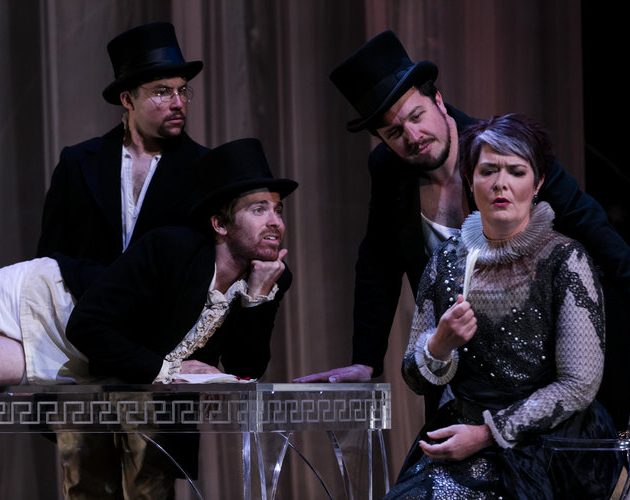
The Return of Ulysses
THE RETURN OF ULYSSES, with Music by Claudio Monteverdi, using a Libretto by Giacomo Badoaro, was first performed at the Teatro Santi Giovanni e Pacio in Venice in the 1639 – 40 Carnival Season. The opera was rarely performed until the late 20th Century and the work has been reconstructed from many sources. This Pinchgut Opera production has been laboured over by the Artistic Director and Conductor, Erin Helyard, utilising the Orchestra of the Antipodes, with guest artists Fernando Guimaraes, performing Ulysses and Catherine Carby as his patient wife, Penelope.
The work originates from the final chapters of Homer’s THE ODYSSEY. After ten years of war at Troy and a further near ten years of wandering on the seas Ulysses, in disguise, returns to the island of Ithaca where he finds his wife Penelope besieged by suitors in the belief that she is a widow.
Gods and human characters of all kinds make up the action of the work where recitative, duets and ensemble are part of the musical formula of the work.
On the night I attended the first act of the opera was rather a tedium. The libretto was dull in its narrative and in its characterisations, with the Director, Chas Rader-Shieber, seeming to simply move the singers/actors perfunctorily around the space without much rhyme or reason. The music was arresting mainly because of the concentration of the members of the orchestra and its conductor, with the utilisation of the ‘authentic’ instruments to conjure a sound that was antique, an ‘early’ music fascination. As well, the Design, by Melanie Liertz, was not particularly useful as support for the story and mostly boring in its striving for an aesthetic arrest.
Unlike some others who had sat around us, we stayed for the second half.
The experience was like night and day. Whether it was the drink refresher or not during the interval, the second half had a coherence of readable narrative, blessed with emotional yearnings from, romantic to tragic, and leavened with a contrasting humour. One was induced to participate with the event. The design seemed to awaken to broadening and deepening its affects, with the Lighting ,by Nicholas Rayment, expanding that effect with casual, unfurling beauty.
The singing of Brenton Spiteri (Telemachus) and that of Fernando Guimaraes (Ulysses) was engaging and Catherine Carby (Penelope) added a yearning warmth that gave real satisfaction. The three suitors giving humour to their predicament. sang with perky alert contributions of style and effect. The Director handled this act with grace and sensitivity that the more perfunctory first act had none of. To be utterly pedestrian, the second act was, as well, considerably shorter than the first.
One was pleased that one had stuck it out and returned to the auditorium after the interval.
Pinchgut Opera produce this work without much (or any) subsidy. Watching the devoted concentration of the audience one was struck by the absolute need that this company and its field of interest have as a part of the fabric of the Sydney cultural scene, that undoubtedly, enhances this city and gives it a quality of life, that without it, would have not as much depth. Not to have this work and this company as a possible choice for the devoted (elitist) opera (music) goers would lessen the social capital of these devoted people and their influence. Not to have Pinchgut Opera would diminish this City, State and Country. When the NSW government spends many.many millions of dollars to tear down a sports stadium to replace it with another similar, one wonders why it cannot find some small subsidy to ensure that this jewel of artistic expression is given the means to sustain its contribution.
Conductor, Erin Hellyard and his orchestra, the Orchestra of the Antipodes deserves the assurance of continuity and opportunity. Their presence enhances the audiences lives and the cultural reputation of the City of Sydney.
1 replies to “The Return of Ulysses”
"The Return of Ulysses" was my second experience of this company, my first being last year's thrilling "Artaserse". In "R of U" the skill of the singers – both 'leads' and those in non-heroic roles – is remarkable. The recitative form of the work perhaps presents greater challenges than the more familiar 19th century opera with its more 'audience-friendly' repeats, arias and choruses. Commitment and love for the project – from actor-singers, orchestra and conductor – shine forth and are much appreciated by the audience ( that majority who stayed…as when you, Kevin, saw it, empty seats were suddenly evident after interval.) I hope this company – like the fabled Ulysses – returns …and flourishes.
Comments are closed.